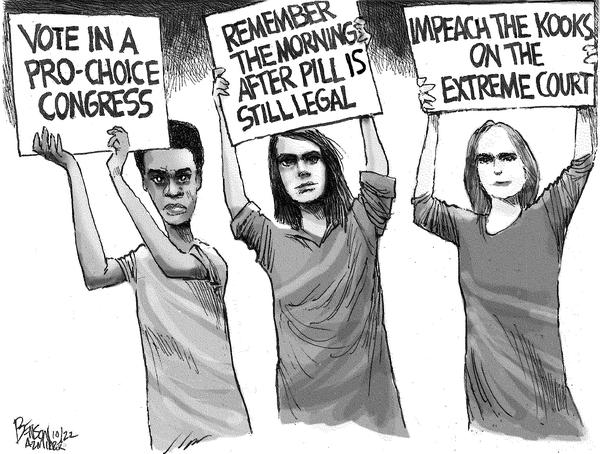General Discussion
Related: Editorials & Other Articles, Issue Forums, Alliance Forums, Region ForumsNew Legal challenges to Florida's abortion law could be groundbreaking
The adoption of the abortion bans violates the establishment clause by adopting the religious of some Christian nut cases. The Torah, the Talmud, and the Koran all take the position that life does not begin at conception. The RWNJ are in effect requiring Jews, Muslims and other groups to live with and consent to their religious views. The government cannot favor one religion over other religions
My religion is clear that life does not begin at conception. Laws that require me to live with this religious view point violate the separation of church and state.
Link to tweet
https://www.msnbc.com/opinion/msnbc-opinion/florida-s-abortion-law-faces-groundbreaking-legal-challenge-n1299950?cid=sm_npd_ms_tw_ma
Even if these cases don’t immediately succeed, the plaintiffs are helping to transform the debate on the meaning of secularism in America by exposing a false division between “religious” and “secular” citizens. Ideally, these interventions will foster a much more sophisticated political dialogue about the promise of secular governance. For at some point these cases are going to force a district or circuit court judge, or maybe even a gaggle of United States Supreme Court justices, to confront some of the neon-light-blinking religious inequalities that HB 5 and similar laws create.
The reality is that abortion restrictions don’t just infringe on the rights of secular people — they also suppress the rights of many religious people outside the Christian right.....
The Rev. Tom Capo of the Unitarian Universalist Congregation of Miami, whose motion now rests with Florida’s 11th Judicial Circuit, has skillfully pointed out that HB 5 fails “to account for the diverse religious views of many Floridians. . . whose faith leads them to take a very different view of when life begins and to counsel abortion.” Capo’s motion argues that the state’s legislation favors a particular Christian theology, and that this act of non-neutrality violates the establishment clause of the First Amendment, which prohibits Congress from establishing a religion. (As if to prove how little he cared about the optics of neutrality, Gov. Ron DeSantis owned the libs yet again by signing the bill into law at a conservative, Spanish-language church.) Second, it contends that HB 5 trespasses upon the religious free exercise of those citizens who don’t abide by conservative Christian worldviews......
Equal protection is what the Florida plaintiffs are seeking; the right to make personal decisions according to their, not someone else’s, religious scruples. Their intervention will ultimately force the courts to confront the reality, and constitutional implications, of religious diversity. Their intervention pierces through the untenable us-vs.-them logic of the Christian right by demonstrating that when it comes to abortion, there is no unified “us.” Instead, there are lots of religious people who, like nonreligious people, find shelter and solace in secular policies
Mad_Machine76
(24,416 posts)as a theocratic country, not even remotely, so one group's religious views and practices about abortion, LGBTQ people, et. al should have absolutely ZERO bearing on our (still mostly) secular society and its laws.
CrispyQ
(36,482 posts)I have some in my family. God is an American & a republican, to boot, don't ya know? ![]()
Mad_Machine76
(24,416 posts)Unfortunately
Hugh_Lebowski
(33,643 posts)CrispyQ
(36,482 posts)Years ago, after Jack Cafferty turned on George W Bush & the Iraq war, when CNN whittled his time down to a few minutes a day on Wolf's show, Cafferty did a three minute segment on the dominionists & he was alarmed. They came back to him again, later in the show, where he read viewers comments & viewers were alarmed, too, at what they heard. But did CNN ever do a special on this freak show religion? Oh hell no.
This is a good article, from CNN, no less. Too bad it's about 20 years too late.
An ‘imposter Christianity’ is threatening American democracy
Analysis by John Blake, CNN
Updated 12:46 PM EDT, Sun July 24, 2022
https://www.cnn.com/2022/07/24/us/white-christian-nationalism-blake-cec/index.html
snip...
The insurrection marked the first time many Americans realized the US is facing a burgeoning White Christian nationalist movement. This movement uses Christian language to cloak sexism and hostility to Black people and non-White immigrants in its quest to create a White Christian America.
more...
White Christian nationalist beliefs have infiltrated the religious mainstream so thoroughly that virtually any conservative Christian pastor who tries to challenge its ideology risks their career, says Kristin Kobes Du Mez, author of the New York Times bestseller, “Jesus and John Wayne: How White Evangelicals Corrupted a Faith and Fractured a Nation.”
more...
One of the most popular beliefs among White Christian nationalists is that the US was founded as a Christian nation; the Founding Fathers were all orthodox, evangelical Christians; and God has chosen the US for a special role in history.
These beliefs are growing among Christians, according to a survey last year by the Barna Group, a company that conducts surveys about faith and culture for communities of faith and nonprofits. The group found that an “increasing number of American Christians believe strongly” that the US is a Christian nation, has not oppressed minorities, and has been chosen by God to lead the world.

gratuitous
(82,849 posts)The folks involved here can point to an actual paper trail of writings over thousands of years to buttress their contention that their beliefs are firmly rooted in history and philosophy. I don't know how long a corporation has had its religious beliefs that it holds so sincerely, but Hobby Lobby's longevity can't come anywhere to the Talmud.
Leaving aside the whole preposterous question of a corporation having religious beliefs - sincerely held or merely convenient - the notion of "sincerely held religious beliefs" has no basis in the Constitution, and is certainly no ground for imposing those beliefs on all citizens by judicial activists.
Baitball Blogger
(46,745 posts)in a long time.
Hermit-The-Prog
(33,372 posts)